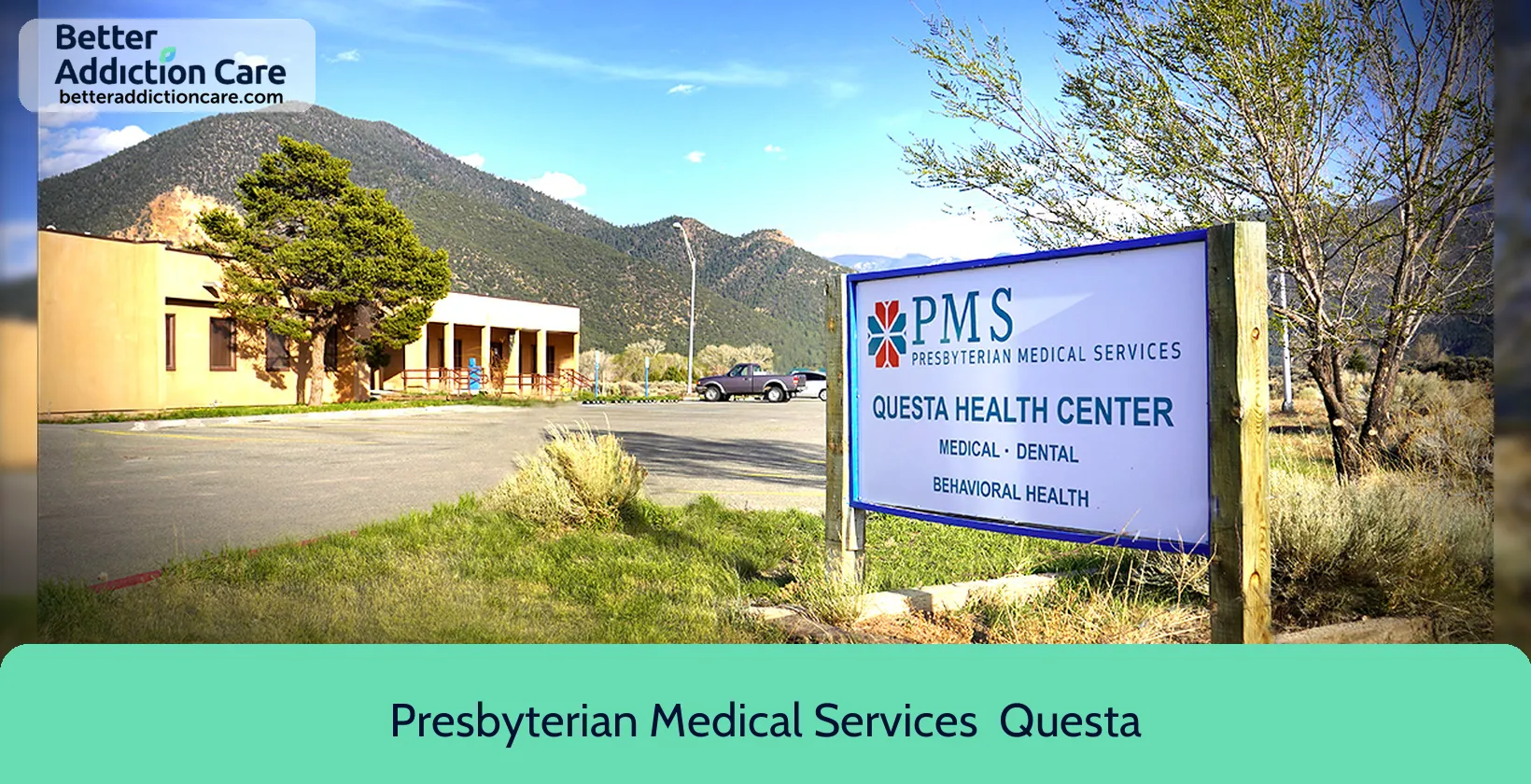Presbyterian Medical Services - Questa Health Center
Overview
Presbyterian Medical Services - Questa Health Center is a mental health treatment center for people seeking treatment near Taos County. As part of their treatment modalities for recovery, Presbyterian Medical Services - Questa Health Center provides family counseling, individual psychotherapy, and eating disorder treatment during treatment. Presbyterian Medical Services - Questa Health Center is located in Questa, New Mexico, accepting community mental health block grants for treatment.
Presbyterian Medical Services - Questa Health Center at a Glance
Payment Options
- Community Mental Health Block Grants
- Medicaid
- Private health insurance
- Cash or self-payment
- State-financed health insurance plan other than Medicaid
Assessments
- Comprehensive mental health assessment
- Comprehensive substance use assessment
- Screening for tobacco use
- Screening for mental disorders
- Screening for substance use
Age Groups
- Adults
- Children/adolescents
- Young adults
- Seniors
Ancillary Services
- Case management service
- Court-ordered outpatient treatment
- Integrated primary care services
- Suicide prevention services
- Acupuncture
Highlights About Presbyterian Medical Services - Questa Health Center
7.45/10
With an overall rating of 7.45/10, this facility has following balanced range of services. Alcohol Rehabilitation: 8.00/10, Drug Rehab and Detox: 7.23/10, Insurance and Payments: 6.27/10, Treatment Options: 8.30/10.-
Treatment Options 8.30
-
Alcohol Rehabilitation 8.00
-
Drug Rehab and Detox 7.23
-
Insurance and Payments 6.27
Accreditations
State mental health department:
State mental health department accreditation refers to the process of evaluating and certifying the quality and standards of a state's mental health department, ensuring that it provides high-quality services and meets specific criteria for mental health care. The accreditation process is performed by a third-party organization and helps to improve the overall care and treatment of individuals with mental health conditions.
State department of health:

Government agencies issue State Licenses, granting rehabilitation organizations permission to operate their businesses legally within specific geographic regions. The licenses needed for legal operation are typically determined by the type of rehabilitation program offered by a facility and its physical location.
The Joint Commission:

The Joint Commission accreditation for addiction and behavioral health signifies that a facility has met rigorous standards in patient care, treatment, and safety. This recognition assures patients and professionals of the facility's commitment to providing high-quality, evidence-based care in the fields of addiction and behavioral health, fostering trust and confidence in their services.
Federally Qualified Health Center:
Federally Qualified Health Center (FQHC) accreditation is a process of evaluation and recognition by the federal government for community health centers that provide comprehensive and accessible healthcare services to underserved populations. FQHC accreditation is essential for centers to receive federal funding and to ensure that they meet standards for quality, patient-centered care.
SAMHSA certification for opioid treatment program (OTP):
SAMHSA's Opioid Treatment Programs (OTP) Accreditation is a rigorous recognition process, signaling an OTP's commitment to high-quality care for those with opioid use disorders. It assures patients, families, and the community that the program adheres to evidence-based practices, maintains a safe environment, and employs qualified staff. This accreditation represents a commitment to addressing the opioid epidemic and promoting recovery, symbolizing quality and accountability in opioid addiction treatment.
Drug Enforcement Agency (DEA):
DEA accreditation refers to the process by which a law enforcement agency is recognized by the Drug Enforcement Agency (DEA) as having met specific training, operational, and resource requirements necessary to participate in DEA-led drug enforcement efforts. This accreditation allows the agency to perform DEA-related tasks such as conducting investigations, executing federal search warrants, and participating in joint task forces.
Treatment At Presbyterian Medical Services - Questa Health Center
Treatment Conditions
- Mental health treatment
- Alcoholism
- Opioid Addiction
- Substance use treatment
- Co-occurring Disorders
Care Levels
- Intensive outpatient treatment
- Detoxification
- Outpatient
- Hospital inpatient treatment
- Outpatient methadone/buprenorphine or naltrexone treatment
Treatment Modalities
- Family counseling
- Individual psychotherapy
- Eating Disorder Treatment
- Nicotine replacement
- Group counseling
Ancillary Services
Languages
- Sign language services for the deaf and hard of hearing
Additional Services
- Pharmacotherapies administered during treatment
- Housing services
- Drug or alcohol urine screening
Special Programs
- Clients with HIV or AIDS
- Children/adolescents with serious emotional disturbance (SED)
- Active duty military
- Persons with eating disorders
- Clients who have experienced trauma
Contact Information
Read our Most Recent Article About Drug Addiction
DISCLAIMER: The facility name, logo and brand are the property and registered trademarks of Presbyterian Medical Services - Questa Health Center, and are being used for identification and informational purposes only. Use of these names, logos and brands shall not imply endorsement. BetterAddictionCare.com is not affiliated with or sponsored by Presbyterian Medical Services - Questa Health Center.









